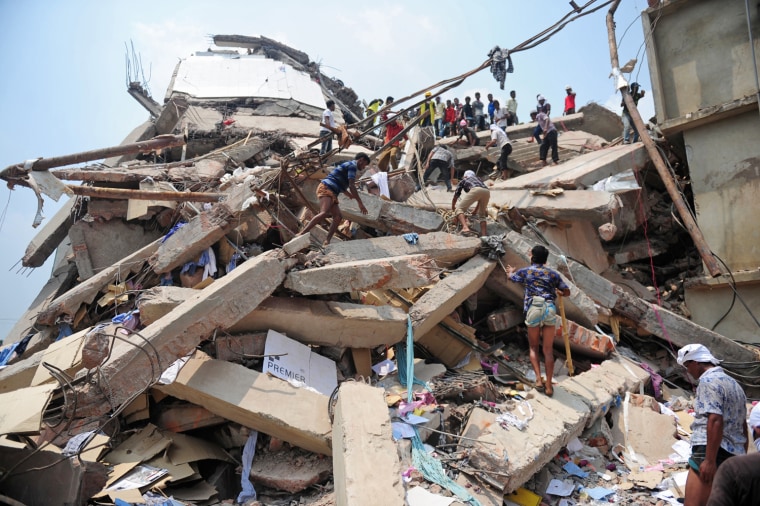
DHAKA, Bangladesh -- Survivors from a building that collapsed in Bangladesh killing more than 250 mainly women workers described hearing a deafening crack before the complex housing factories supplying Western clothes retailers crashed down in a matter of seconds.
Dozens more victims were thought to be still trapped in the rubble after the disaster, which comes five months after a factory fire killed 112 people. The tragedy could further hurt Bangladesh's reputation as a source of low-cost goods for European and North American firms.
Local residents helped pull survivors from the twisted wreckage of the eight-story Rana Plaza building which collapsed on Wednesday in Savar, 20 miles outside the capital Dhaka. More than 1,000 people were injured.
Relatives identified their dead among rows of corpses.
"An unspecified number of victims are still trapped," said Mizanur Rahman, a rescue worker with the fire brigade, as he clambered over the wreckage. "We can't be certain of getting them all out alive. We are losing a bit of hope."
Dhaka's district police chief Habibur Rahman said the death toll could rise further.
"I was at work on the third floor, and then suddenly I heard a deafening sound, but couldn't understand what was happening," said factory worker Zohra Begum. "I ran and was hit by something on my head."
The government declared a national day of mourning and flags were flown half-staff at all official buildings.
Dhaka city development authority had filed a case against the building's owner for faulty construction, police chief Rahman said. It filed another case against the owner and the five garments factories for causing unlawful death.
Images: Desperate search for survivors
Bangladesh Garment Manufacturers and Exporters Association (BGMEA) President Mohammad Atiqul Islam said there were 3,122 workers in the factories on Wednesday. He said there had been indications from local officials that cracks had been found in the building the day before.
"We asked the garment owners to keep it closed," Islam said.
Rana Plaza's owner had told proprietors of the building's five garment factories that the cracks were not dangerous, Islam added. "After getting the green signal from the plaza owner all the garment factories opened," he said.
However, police official Mohammad Asaduzzaman said factory owners appeared to have ignored a warning not to allow their workers into the building after a crack was detected on Tuesday.
More than 1,000 textile workers besieged the BGMEA offices on Thursday, pelting it with stones and clashing with riot police, TV channels showed. The workers demanded all garment factories be shut and the owners harshly punished for accidents.
Mohammad Mosharraf, who was rescued on Thursday after 26 hours, said he had been hit on the head by something heavy and knocked unconscious when the building came down.
"When I regain my sense I found another four colleagues are also trapped under the debris of the building," he told Reuters. "We desperately tried to shout for someone to rescue us. Initially we didn't receive any response, but we moved to another part of the floor and found some light and heard voices."
The Rana Plaza building collapse follows a fire at the Tazreen Fashion factory on the outskirts of Dhaka that killed 112 people in November and another incident at a factory in January in which seven people died, compounding concerns about worker safety and low wages in Bangladesh.
U.K. clothing retailer Primark confirmed that one of its suppliers occupied the second floor of the building.
Canada's Loblaw, a unit of food processing and distribution firm George Weston Ltd, also confirmed a connection with the building. It said one factory made a small number of "Joe Fresh" apparel items for the company.
Documents including order sheets and cutting plans obtained by Reuters appeared to show that other major clothing brands such as Spain's Mango and Benetton had used suppliers in the building in the last year. A Benetton spokesman said none of the factories were suppliers to the company.
About 3.6 million people work in Bangladesh's garment industry, making it the world's second-largest apparel exporter.
Wal-Mart said on Wednesday it had not determined whether a factory in the building that collapsed was producing goods for the company.